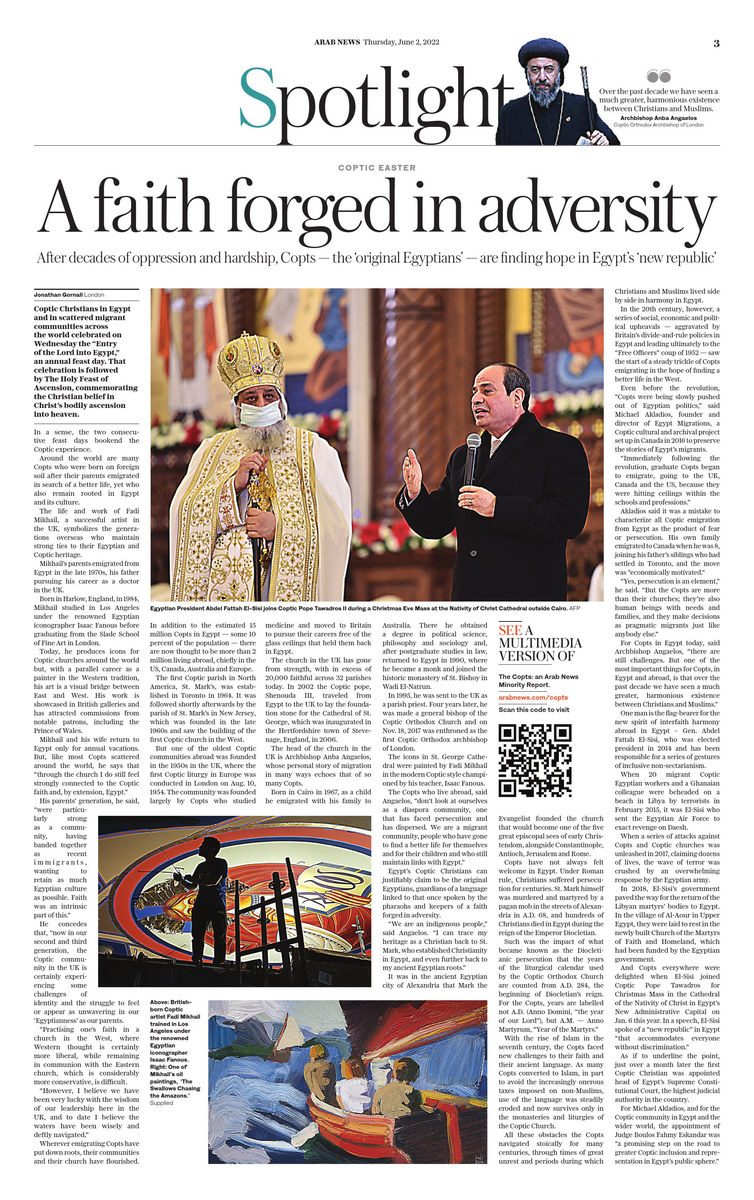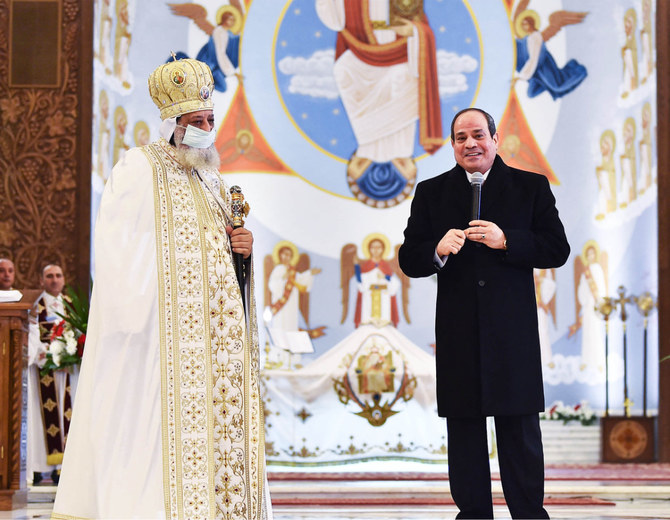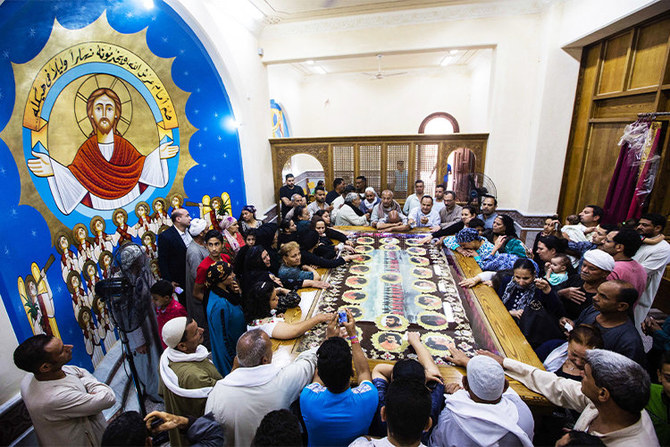LONDON: Coptic Christians in Egypt and in scattered migrant communities across the world celebrated on Wednesday the "Entry of the Lord into Egypt,” an annual feast day. That celebration is followed by The Holy Feast of Ascension, commemorating the Christian belief in Christ’s bodily ascension into heaven.
In a sense, the two consecutive feast days bookend the Coptic experience. The one marks their deep-rooted pride in an Egyptian heritage that predates the arrival of Islam, while the other celebrates the spiritual value of self-sacrifice, which would come to define the experience of a church forged in martyrdom soon after Christ’s death on the cross.
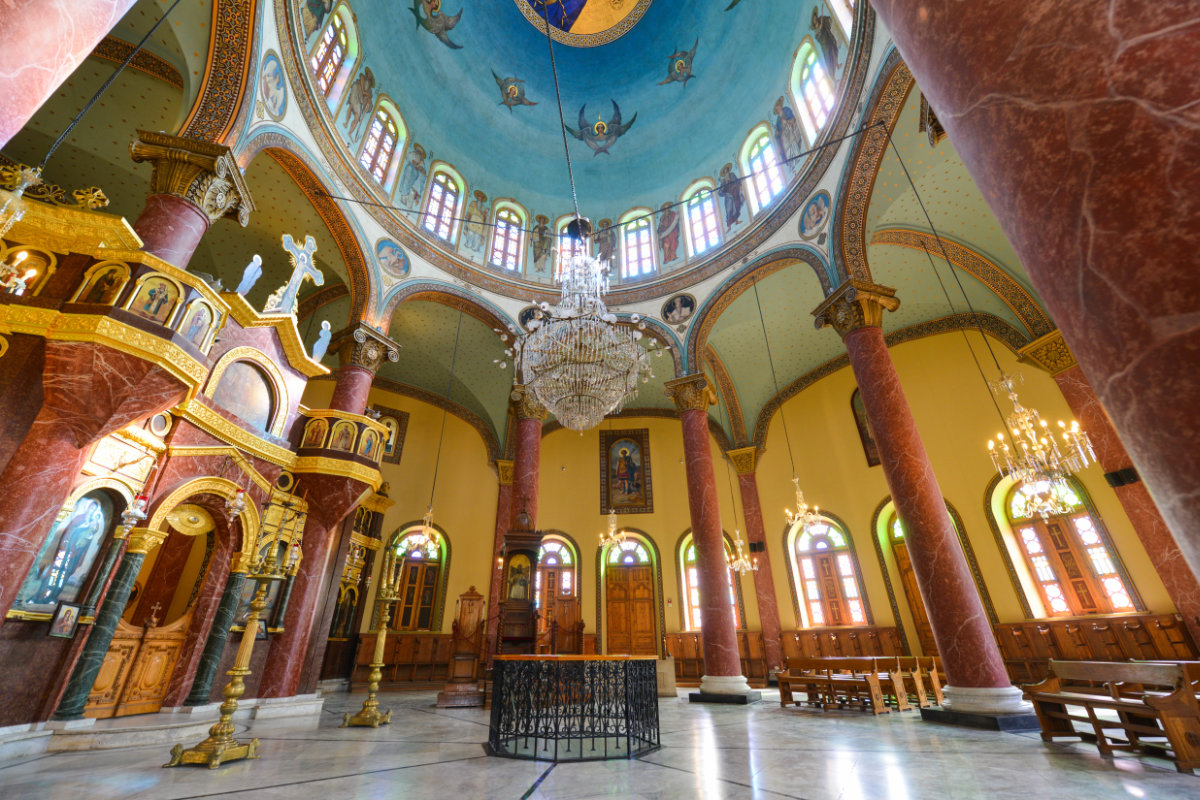
Interior details of Saint George Church in Coptic Cairo, Egypt. (Shutterstock)
Back in April, Egypt’s Christians celebrated two other consecutive special days.
Orthodox Easter fell on April 24, a date set by the Julian calendar under which the Church of Alexandria operates, rather than the Gregorian calendar used by the rest of Christianity, with which the Copts parted ways over theological differences in the fifth century.
But the following day, together with Egyptians of all faiths, Copts celebrated the national holiday of Sham Ennessim. The origins of this festival of spring date back millennia to the days of the pharaohs and, like the Copts themselves, survived the Arabization of Egypt in the seventh century to become an integral part of Egyptian society.
Around the world are many Copts, some now second or even third generation, who were born on foreign soil after their parents emigrated in search of a better life, yet who also remain rooted in Egypt and its culture.
The life and work of Fadi Mikhail, a successful artist in the UK, symbolizes the generations who were born overseas to immigrant parents, but maintain strong ties to their Egyptian and Coptic heritage.
Mikhail’s parents, Hany and Salwa, emigrated from Egypt in the late 1970s, his father pursuing his career as a doctor in the UK. “The promise of higher pay and a better life called to him,” said Mikhail.
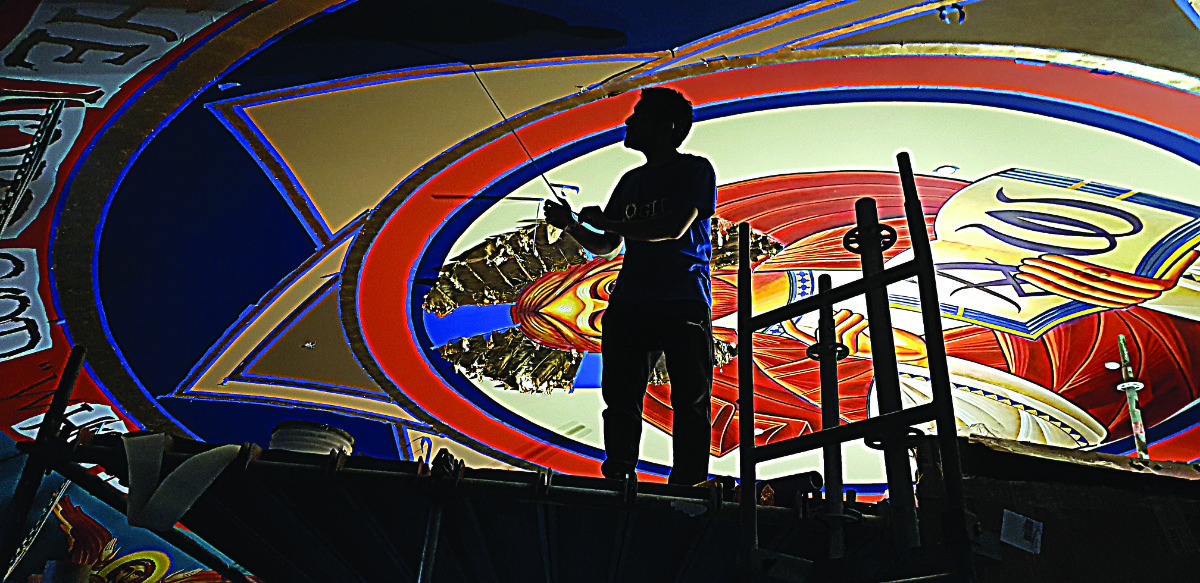
British-born Coptic artist Fadi Mikhail trained in Los Angeles under the renowned Egyptian iconographer Isaac Fanous. (Supplied)
Born in Harlow, England, in 1984, Mikhail studied in Los Angeles under the renowned Egyptian iconographer Isaac Fanous before graduating from the Slade School of Fine Art in London.
Today, he produces icons for Coptic churches around the world, but his art is a visual bridge between East and West — he has a parallel career as a painter in the Western tradition, working in oils to produce landscapes, or drawing inspiration from books he enjoyed as a child.
His work is showcased by British galleries and has led to commissions for notable patrons, including the Prince of Wales.
Mikhail and his wife return to Egypt only for the occasional annual vacation. But, like most Copts scattered around the world, he says that “through the church I do still feel strongly connected to the Coptic faith and, by extension, Egypt.”
His interest in iconography “certainly began as a religious connection but has more recently become equally a part of my identity as an Egyptian.”

One of Fadi Mikhail’s oil paintings, ‘The Swallows Chasing the Amazons.’ (Supplied)
His parents’ generation, he said, “were particularly strong as a community, having banded together as recent immigrants, wanting to retain as much Egyptian culture as possible. Faith was an intrinsic part of this.”
He concedes that, “now in our second and third generation, the Coptic community in the UK is certainly experiencing some challenges of identity and the struggle to feel or appear as unwavering in our ‘Egyptianness’ as our parents.
“Practising one’s faith in a church in the West, where Western thought is certainly more liberal, while remaining in communion with the Eastern church, which is considerably more conservative, is difficult.
“However, I believe we have been very lucky with the wisdom of our leadership here in the UK, and to date I believe the waters have been wisely and deftly navigated.”
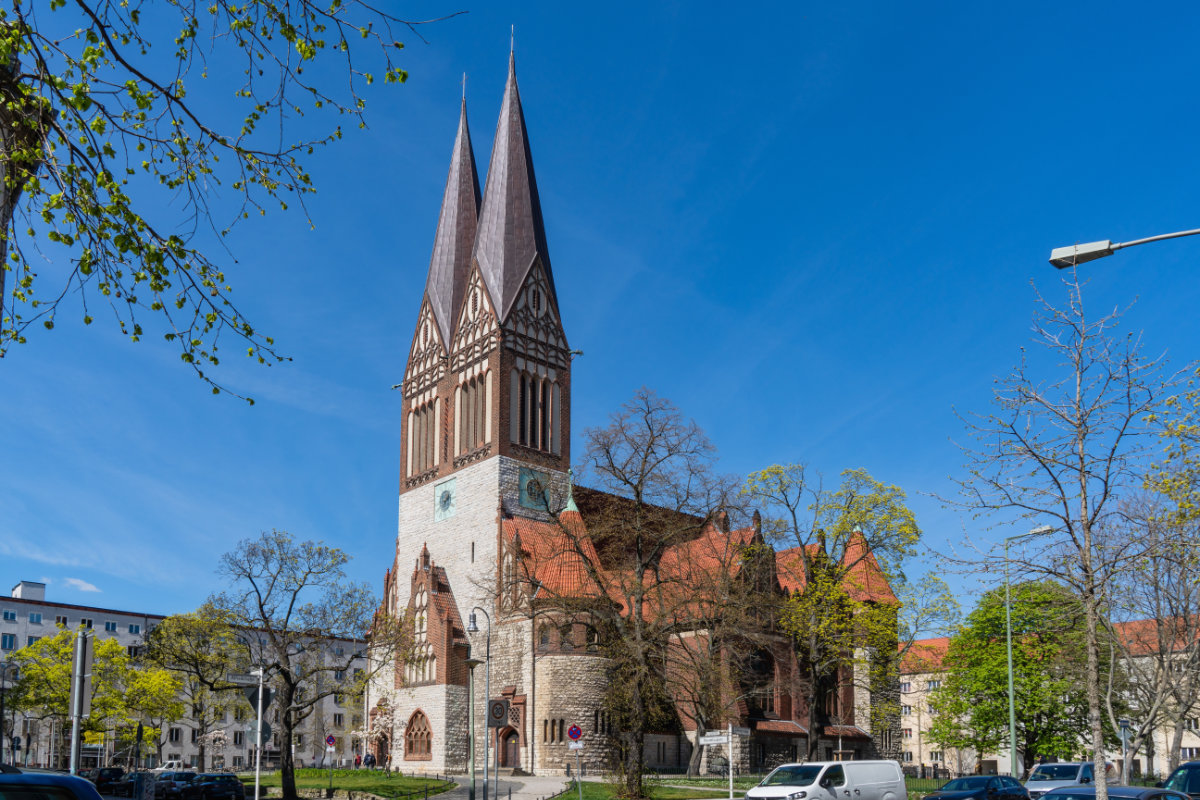
The Glaubenskirche in Berlin, Germany, a former Lutheran church, has been owned since 1998 by the Coptic Church, and it is being developed into a Coptic bishop's residence. (Shutterstock)
Wherever emigrating Copts have put down roots, their communities and their church have flourished. In addition to the estimated 15 million Copts in Egypt — some 10 percent of the population — there are now thought to be more than 2 million living abroad, chiefly in the US, Canada, Australia and Europe, where they make up mainly a wealthy and educated immigrant class of professionals, such as doctors or engineers.
The first Coptic parish in North America, St. Mark’s, was established in Toronto in 1964. It was followed shortly afterwards by the parish of St. Mark’s in New Jersey, which was founded in the late 1960s and saw the building of the first Coptic church in the West.
But one of the oldest Coptic communities abroad was founded in the 1950s in the UK, where the first Coptic liturgy in Europe was conducted in London on Aug. 10, 1954. The community was founded largely by Copts who studied medicine and moved to Britain to pursue their careers free of the glass ceilings that held them back in Egypt.
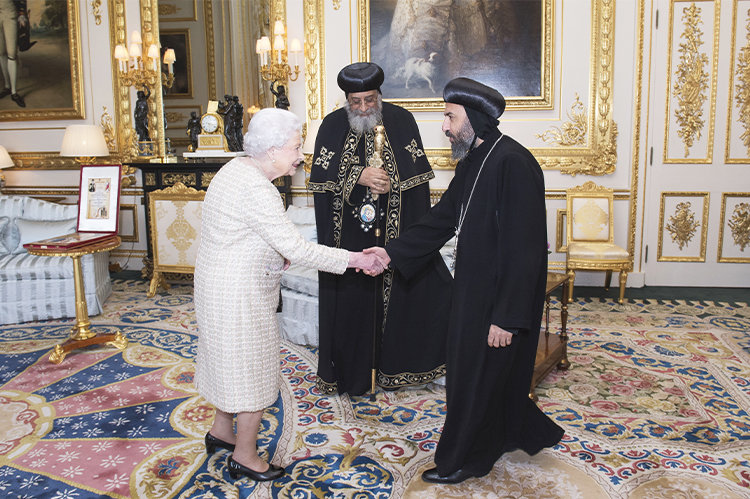
Queen Elizabeth II meets Pope Tawadros II and Bishop Angaelos of the Coptic Church during a private audience at Windsor Castle on May 9, 2017 in Windsor, UK. (Getty Images)
In 1978, the Coptic pope, Shenouda III, traveled from Egypt to the UK to consecrate St. Mark’s Coptic Orthodox Church in Kensington, London, the first Coptic Orthodox Church in Europe.
Since then, the church in the UK has gone from strength, with in excess of 20,000 faithful across 32 parishes. In 2002 Shenouda returned to lay the foundation stone for the Cathedral of St. George, which was inaugurated in the Hertfordshire town of Stevenage, England, in 2006.
The head of the church in the UK is Archbishop Anba Angaelos, whose personal story of migration in many ways echoes that of so many Copts.
Born in Cairo in 1967, as a child he emigrated with his family to Australia. There he obtained a degree in political science, philosophy and sociology and, after postgraduate studies in law, returned to Egypt in 1990, where he became a monk and joined the historic monastery of St. Bishoy in Wadi El-Natrun.
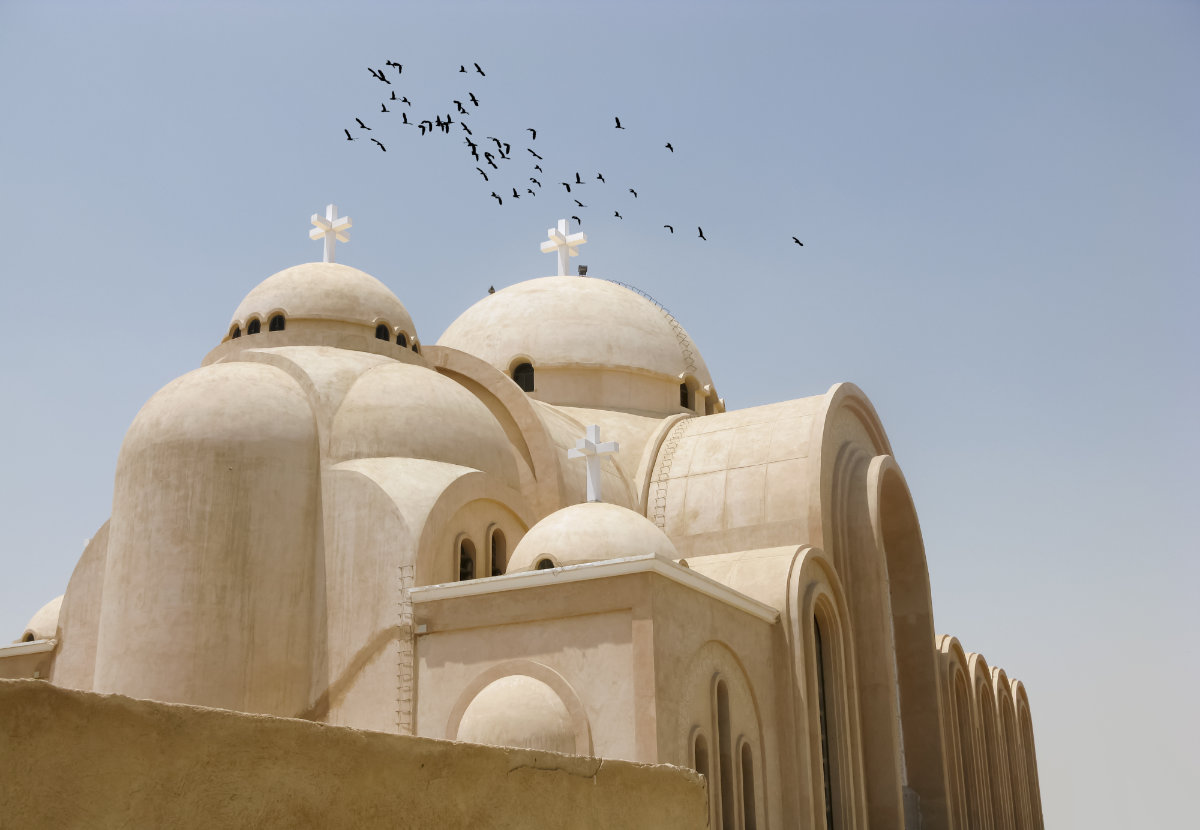
A view of Egypt's historic monastery of Saint Bishoy in Wadi El-Natrun, Cairo. (Shutterstock)
In 1995, he was sent to the UK as a parish priest. Four years later, he was made a general bishop of the Coptic Orthodox Church and on Nov. 18, 2017 was enthroned as the first Coptic Orthodox archbishop of London.
Icons in St. George Cathedral were painted by Fadi Mikhail in the modern Coptic style championed by his teacher Isaac Fanous.
The Copts who live abroad, said Angaelos, “don’t look at ourselves as a diaspora community, one that has faced persecution and has dispersed. We are a migrant community, people who have gone to find a better life for themselves and for their children and who still maintain links with Egypt.”
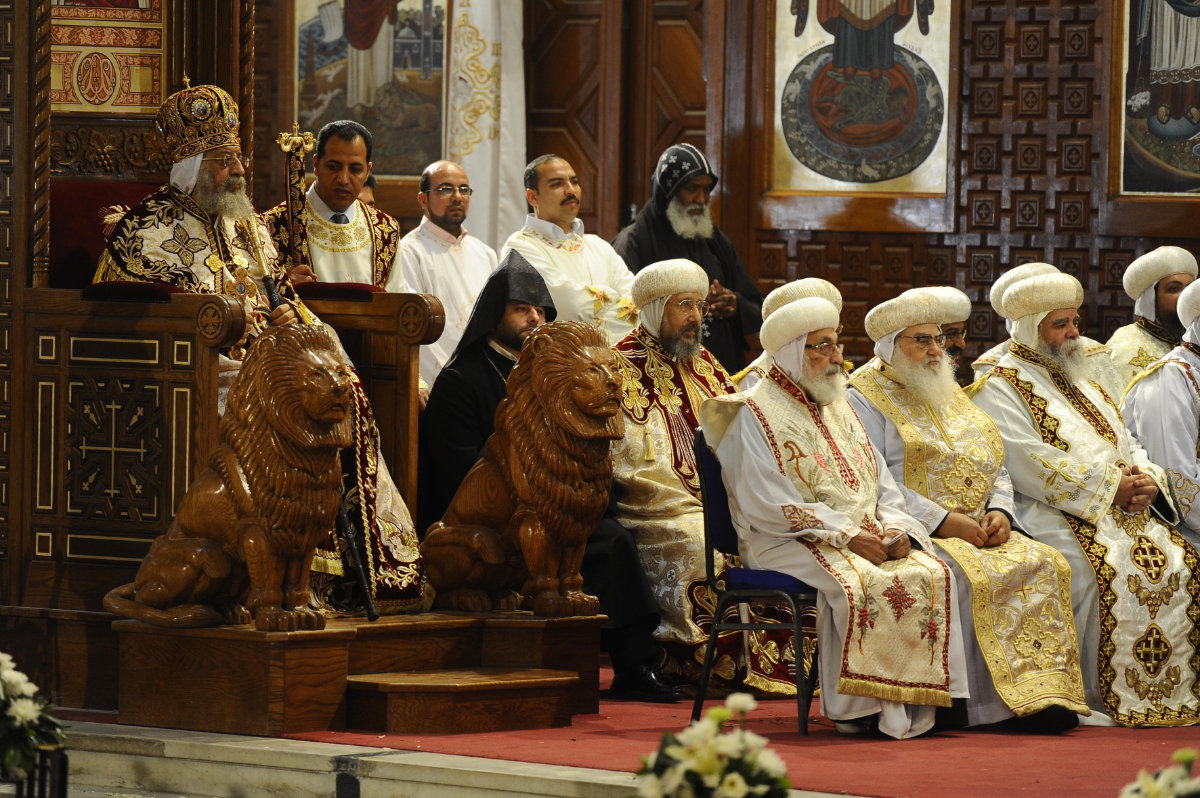
Coptic Orthodox Pope Tawadros II (L) leads the Easter mass at St. Mark's Cathedral in Cairo, Egypt on April 11, 2015. (Anadolu Agency/Getty Images)
Egypt’s Coptic Christians can justifiably claim to be the original Egyptians, guardians of a language once spoken by the pharaohs and keepers of a faith forged in adversity.
“We are an indigenous people,” said Angaelos. “I can trace my heritage as a Christian back to St. Mark, who established Christianity in Egypt, and even further back to my ancient Egyptian roots.”
According to scripture, Mary and Joseph sought refuge in Egypt with the infant Jesus to escape the massacre of all male children aged 2 or under in Bethlehem ordered by King Herod.
A generation later, it was in the ancient Egyptian city of Alexandria that Mark the Evangelist founded the church that would become one of the five great episcopal sees of early Christendom, alongside Constantinople, Antioch, Jerusalem and Rome.
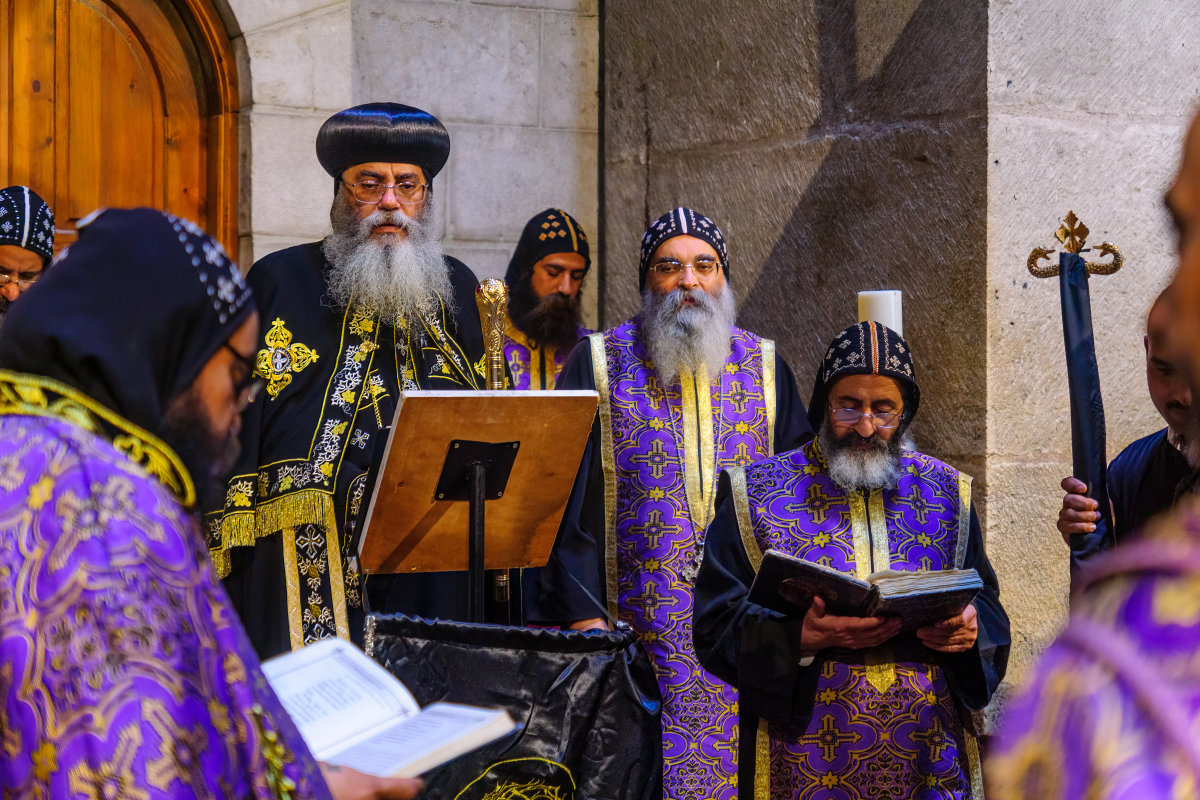
Coptic patriarch and priests celebrate mass on Orthodox Good Friday, in the Holy Sepulchre church of Jerusalem Old City, on April 30, 2021. (Shutterstock)
Copts have not always felt welcome in Egypt. Under Roman rule, Christians throughout the empire suffered persecution for centuries. St. Mark himself was murdered and martyred by a pagan mob in the streets of Alexandria in A.D. 68, and hundreds of Christians died in Egypt during the reign of the Emperor Diocletian.
Such was the impact of what became known as the Diocletianic persecution that the years of the liturgical calendar used by the Coptic Orthodox Church are counted from A.D. 284, the beginning of Diocletian’s reign. For the Copts, years are labelled not A.D. (Anno Domini, “the year of our Lord”), but A.M. — Anno Martyrum, “Year of the Martyrs.”
With the rise of Islam in the seventh century, the Copts faced new challenges to their faith and their ancient language, a direct linguistical descendant from the ancient Egyptian tongue. As many Copts converted to Islam, in part to avoid the increasingly onerous taxes imposed on non-Muslims, use of the language was steadily eroded and now survives only in the monasteries and liturgies of the Coptic Church.
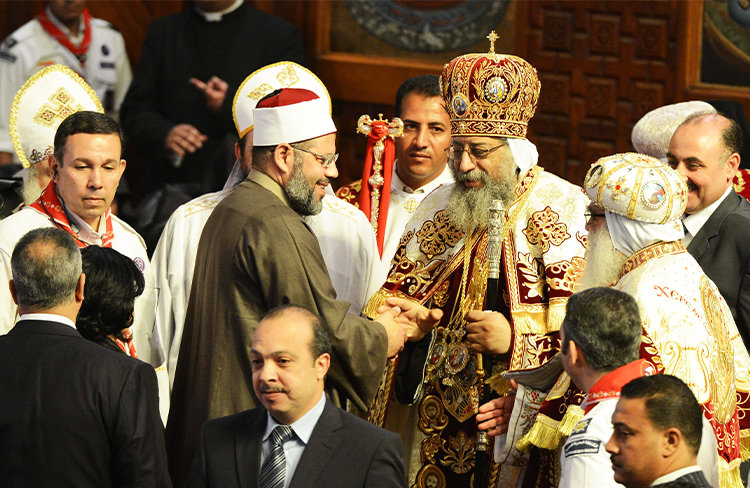
Muslim cleric Sheikh Mohamed Goma (C-L) congratulates Pope Tawadros II during his enthronement ceremony as leader of Egypt's Coptic Christian church in Cairo on Nov. 18, 2012. Christians and Muslims lived side by side in harmony in Egypt through times of great unrest and periods. (AFP)
All these obstacles the Copts navigated stoically for many centuries, through times of great unrest and periods during which Christians and Muslims lived side by side in harmony in Egypt.
In the 20th century, however, a series of social, economic and political upheavals — aggravated by Britain’s divide-and-rule policies in Egypt and leading ultimately to the “Free Officers” coup of 1952 and President Gamal Abdel Nasser’s pan-Arab reforms — saw the start of a steady trickle of Copts emigrating in the hope of finding a better life in the West.
Even before the revolution, “Copts were being slowly pushed out of Egyptian politics,” said Michael Akladios, founder and director of Egypt Migrations, a Coptic cultural and archival project set up in Canada in 2016 to preserve the stories of Egypt’s migrants.
“Immediately following the revolution, graduate Copts began to emigrate, going to the UK, Canada and the US, because they were hitting ceilings within the schools and professions.”
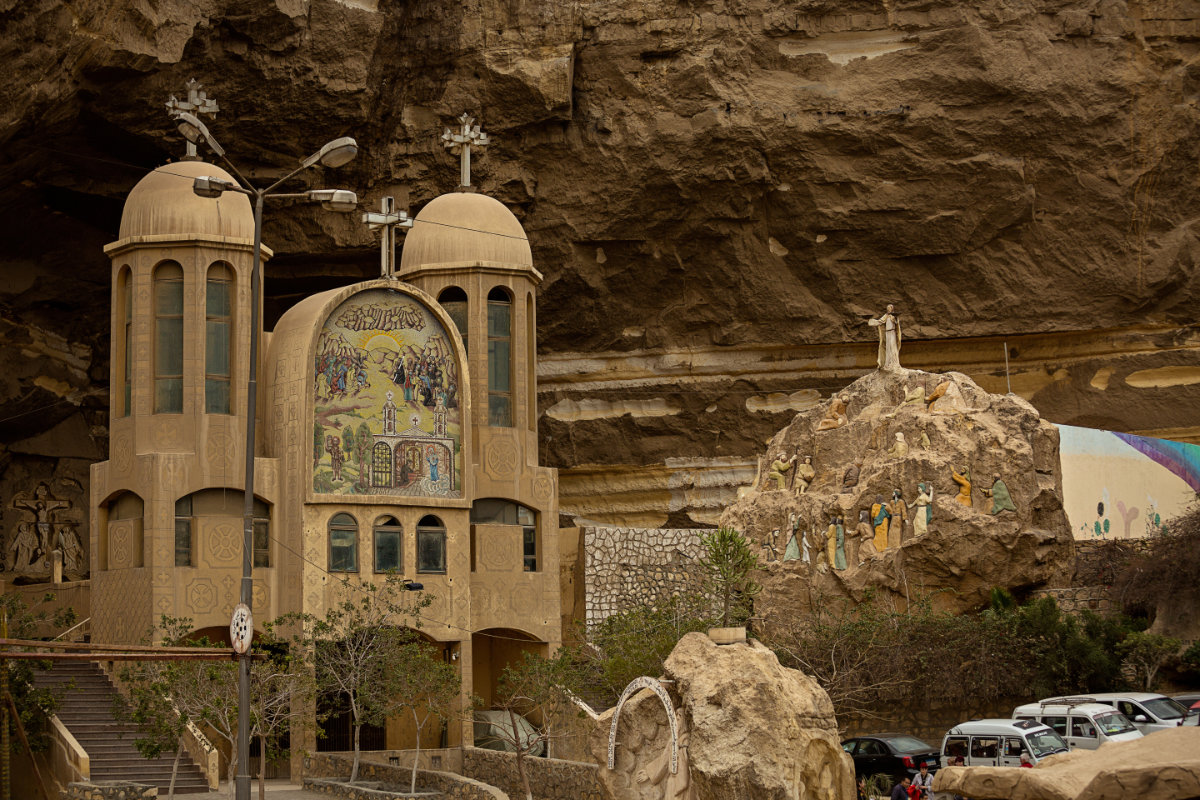
A view of Saint Simon the Tanner Monastery, an old Coptic church in Cairo, Egypt. (Shutterstock)
Akladios said it was a mistake to characterize all Coptic emigration from Egypt as the product of fear or persecution. His own family emigrated to Canada when he was 8, joining his father’s siblings who had already settled in Toronto, and the move was “economically motivated.”
“Yes, persecution is an element,” he said. “But the Copts are more than their churches; they’re also human beings with needs and families, and they make decisions as pragmatic migrants just like anybody else.”
For Copts in Egypt today, said Archbishop Angaelos, “there are still challenges. But one of the most important things for Copts, in Egypt and abroad, is that over the past decade we have seen a much greater, harmonious existence between Christians and Muslims.”
One man is the flag-bearer for the new spirit of interfaith harmony abroad in Egypt – Gen. Abdel Fattah El-Sisi, who was elected president in 2014 and has been responsible for a series of gestures of inclusive non-sectarianism.
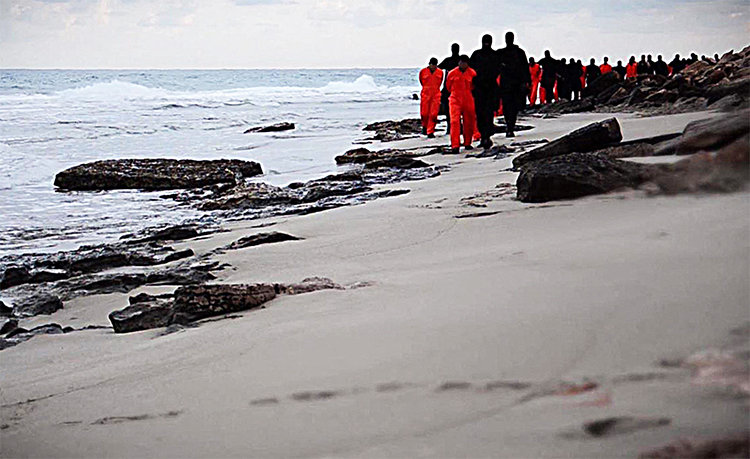
Daesh terrorists lead blindfolded Egyptian Coptic Christians, wearing orange jumpsuits, to be beheaded on a seashore in the Libyan capital of Tripoli in 2015. (AFP file photo)
When 20 migrant Coptic Egyptian workers and a Ghanaian colleague were beheaded on a beach in Libya by terrorists in February 2015, it was El-Sisi who sent the Egyptian Air Force to exact revenge on Daesh.
When a series of attacks against Copts and Coptic churches was unleashed in 2017, claiming dozens of lives, the wave of terror was crushed by an overwhelming response by the Egyptian army.
In 2018, El-Sisi’s government paved the way for the return of the Libyan martyrs’ bodies to Egypt. In the village of Al-Aour in Upper Egypt, where many of the men had lived, they were laid to rest in the newly built Church of the Martyrs of Faith and Homeland, the construction of which had been funded by the Egyptian government.
And Copts everywhere were delighted when El-Sisi joined Coptic Pope Tawadros for Christmas Mass in the Cathedral of the Nativity of Christ in Egypt’s New Administrative Capital on Jan. 6 this year. In a speech, El-Sisi spoke of a “new republic” in Egypt “that accommodates everyone without discrimination.”
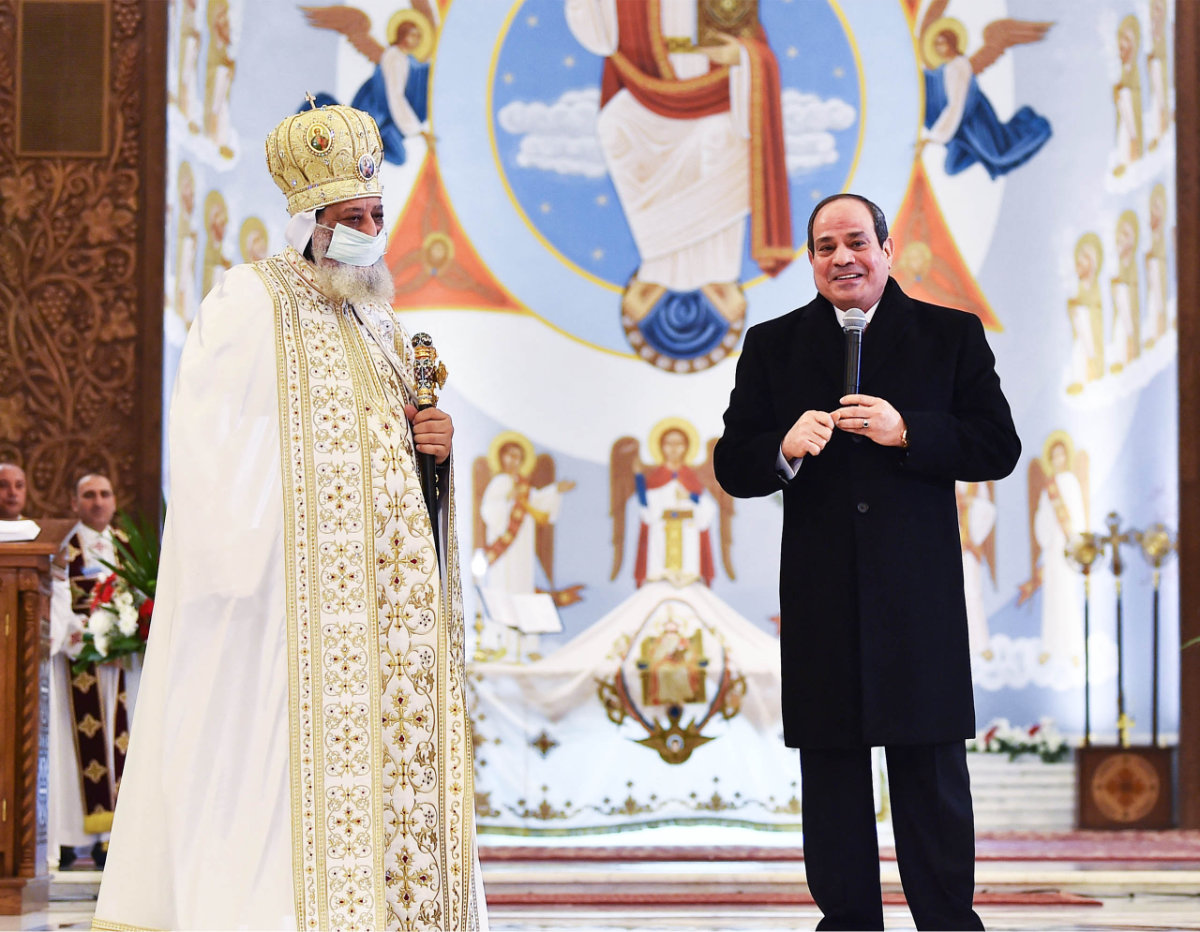
Egypt's President Abdel Fattah El-Sisi (R) speaking alongside Pope Tawadros II of Alexandria during a Coptic Orthodox Christmas Eve mass at the Nativity of Christ Cathedral near Cairo on January 6, 2022. (AFP)
As if to underline the point, just over a month later the first Coptic Christian was appointed head of Egypt’s Supreme Constitutional Court, the highest judicial authority in the country.
For Michael Akladios, and for the Coptic community in Egypt and the wider world, the appointment of Judge Boulos Fahmy Eskandar on Feb. 9, 2022, was “a promising step on the road to greater Coptic inclusion and representation in Egypt’s public sphere.”
Although it was “still too early to judge what ramifications this appointment will have for Coptic communities in Egypt and across its diasporas,” it was nevertheless “symbolic of the state’s continued big gestures for cementing national unity as a prevailing feature of the character of the nation.”
